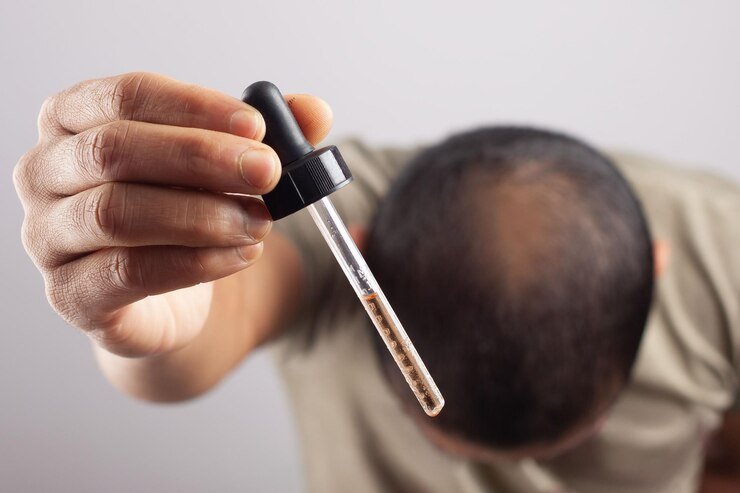
Can I Use Oil After Hair Transplant?
A hair transplant is a life-changing procedure that restores not just your hair but also your confidence. After undergoing such a transformative experience, patients often wonder, "Can I use oil after hair transplant?" This blog will walk you through everything you need to know about using oil post-transplant, including the benefits, risks, and expert recommendations.
At Hair Free and Hair Grow Bangladesh, we understand the importance of proper care to achieve the best results. Our expert team is here to provide personalized guidance on your hair transplant journey, ensuring long-lasting and natural-looking results.
The Healing Process After a Hair Transplant
Following a hair transplant, your scalp enters a healing phase. During the first week, the transplanted grafts are delicate, and your scalp might experience mild inflammation or scabbing. These scabs help protect the newly implanted hair follicles as they settle in their new location.
The healing process can take up to 2–4 weeks. During this time, taking proper care of your scalp is essential to avoid infections and ensure optimal hair regrowth. Adding new products, such as oil, too soon could potentially disrupt this process.
Can I Use Oil on My Scalp After a Hair Transplant?
The short answer is yes, but with precautions. Patients are advised not to use oil in the initial 7 days post-surgery because the scalp and grafts are still healing. Introducing oil during this sensitive period can irritate the scalp, cause infections, or disrupt graft adherence.
After the first week, you may slowly incorporate oil into your routine, but only after consulting your surgeon. Starting oil application too soon can negatively impact your hair transplant recovery, so always follow your doctor's post-op instructions.
Benefits of Using Oil After a Hair Transplant
Once the healing phase is complete, using oil can be beneficial for your scalp and hair health. Here are some reasons why oiling is recommended post-transplant:
- Softening Scabs
Applying oil after the first week helps soften scabs, making them easier to remove during shampooing. This ensures that your scalp remains clean and free of infection. - Hydrating the Scalp
A dry scalp can cause itching and discomfort. Natural oils act as moisturizers, reducing dryness and enhancing scalp recovery. - Boosting Hair Regrowth
Some oils, like rosemary oil, stimulate blood circulation in the scalp, encouraging faster and healthier hair growth. - Reducing Inflammation
Natural oils with anti-inflammatory properties, such as coconut oil, help soothe the scalp and promote healing. - Adding Shine and Strength
Regular oiling can add shine, improve the texture of your hair, and strengthen the hair shaft, contributing to healthier hair overall.
Risks of Using Oil Too Soon After a Hair Transplant
While oiling has numerous benefits, applying it prematurely can have adverse effects:
- Risk of Infection: Oily scalps can attract dirt and bacteria, increasing the likelihood of infections.
- Delayed Healing: Oils can interfere with the natural healing process by trapping dirt or chemicals near the grafts.
- Graft Damage: Excessive rubbing or massaging while applying oil can loosen the grafts, leading to transplant failure.
Best Oils for Post-Hair Transplant Care
When selecting an oil, it's essential to choose natural, chemical-free options. Here are some of the best oils for post-transplant care:
- Coconut Oil: Rich in antioxidants, it hydrates and soothes the scalp.
- Castor Oil: Packed with nutrients, it supports hair regrowth and strengthens hair roots.
- Almond Oil: Reduces scalp dryness and irritation, enhancing recovery.
- Olive Oil: Known for its moisturizing properties, it nourishes the scalp and adds shine.
- Rosemary Oil: Stimulates blood flow and promotes faster hair regrowth.
Always opt for fragrance-free oils to avoid scalp irritation and check for alcohol or chemical content before purchasing.
Expert Opinions on Oil Use After a Hair Transplant
Most surgeons agree that you can begin oiling your scalp 2–4 weeks after a hair transplant. The exact timeline depends on individual healing and the doctor's recommendations. Here's what experts advise:
- Use Minimal Oil: Start with a small amount to test how your scalp reacts.
- Massage Gently: Avoid vigorous rubbing; use your fingertips in circular motions.
- Stick to Natural Oils: Avoid oils with artificial fragrances or alcohol-based ingredients.
Recommendations from Surgeons and Hair Restoration Specialists
- Follow Post-Op Instructions: Always consult your doctor before adding anything to your routine.
- Avoid Over-Oiling: If your scalp tends to be oily, limit oiling to once a week. For dry scalps, twice a week is sufficient.
- Time Your Oiling: Nighttime is ideal for oil application, as it allows the oil to penetrate for 6–8 hours. However, people with dandruff should apply oil 30 minutes before shampooing instead.
Conclusion
So, can I use oil after hair transplant? Yes, but timing and type of oil matter. Using natural oils after 2–4 weeks can hydrate your scalp, boost healing, and enhance hair regrowth. Always consult your surgeon before introducing oils into your routine. Remember, patience and proper care are key to achieving long-lasting results.
If you're planning a hair transplant or looking for expert aftercare advice, connect with Hair Free and Hair Grow Bangladesh. With their expertise and advanced techniques, they ensure optimal results and personalized care every step of the way. Schedule your consultation today and take the first step toward confident, healthy hair!
FAQs
1. Can I apply coconut oil right after my hair transplant?
No, coconut oil or any oil should not be applied within the first week of your transplant. Wait until your surgeon approves it, usually after 7–14 days.
2. How soon can I start massaging oil into my scalp?
You can start gentle oil massages 2–4 weeks post-transplant, depending on your healing progress and your surgeon's advice.
3. Will using oil help speed up hair regrowth after a transplant?
Yes, oils like rosemary oil can promote faster regrowth by stimulating blood circulation and nourishing the scalp.
4. What if I accidentally use oil too soon after the procedure?
If you use oil prematurely, it may cause irritation or disrupt grafts. Immediately consult your doctor for guidance.


